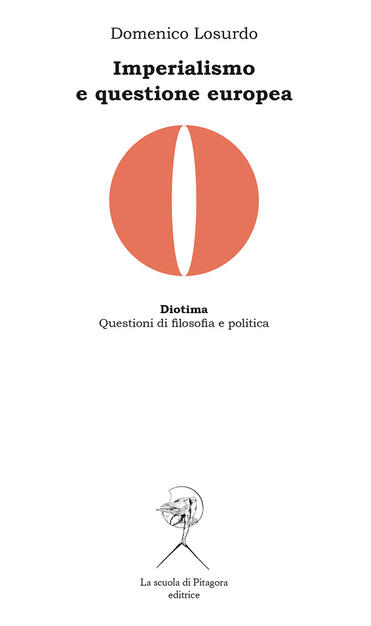João Carlos Graça, Lisboa, 19 de Janeiro de 2010 - 19 gennaio 2011 05:17
Dear Professor Losurdo
Congratulations for this publication in Portuguese, and of course thank you for that. Still, I must make a request that your Controstoria del Liberalismo be translated as Contra-história do Liberalismo and not (assuredly not) as Contra-história da Democracia (sic!).
I would abstain from this remark (that may well be taken as picky), had it not so likely fallen into the category of "Leitfehler", or meaningful errors. It is not necessary to be a maniac of philology to understand how much this may reveal of subordination to the dominant ideology even by those claiming (and really wanting) to oppose it. Seldom has a traduttora been, if against her will, so much a traditora...
Be as it may, that ought to be emended for the sheer sake of truth - always an important thing, as you yourself so brightly underline in the interview. Please accept my respectful
Saudações cordiais
Rafael Granados desde la Espagna 17 gennaio 2011 04:30
Tiene toda la razón Pedro Aguiar, cuando afirma que antonino franca,repite todos los "cliches revisionistas".La posición ideologica de antonino está claramente en la linea pro-kulak de Bujarin- cita a Roy mededeiev,admirador de bujarin y de sus posiciones anticomunistas, asi como de sus traiciones a la Urss al lado de Yezov, Frinovsky y Tujachevsky(vid Grover furr).Por supuesto , no falta el consabido "mantra" alusivo a los "crimenes de Stalin" que repite a diario toda la prensa liberal y conservadora de todo el mundo.
adendda 17 gennaio 2011 04:44:
Cabe añadir que aquí en España, como ocurre en Italia ó en Brasil, todas las publicaciones de la "izquierda alternativa", sean libertarias. troskistas, ecosocialistas, etc, etc, son patologicamente antistalinistas,pues eso las hace "respetables" ante la burguesia y ante su potencial clientela izquierdista.
Por supuesto la imagen que construyen de stalin poco tiene que ver con la verdad histórica del stalin real, especialmente del stalin como hombre de estado y no solo como revolucionario bolchevique,situaciones que aunque no son totalmente disociables, conviene poner en planos distintos.
Nuestros "izquierdistas" del siglo XXI, olvidan que junto a una "dialectica de clases" existe una "dialectica de estados".
Esta es una de las razones principales por la que Stalin es una figura totalmente incomprendida y odiada por nuestra beatífica "izquierda" multicolor del siglo XXI.
João Carlos Graça Lisboa, 20 de Janeiro de 2011
Dear All,
Antonino Infranca's review is a complete mess and a low quality text, full of prejudice and confusions. It definitely doesn’t do justice to Professor Losurdo’s Stalin. Let me refer some aspects that have more stroked my attention.
First moment, Infranca conglobates ethics and politics completely, under one single category: “questione fondamentale ed etico-politica”… Next moment, in a straightforward inversion, he chooses to oppose them completely, or rather repeats the infamous Arendtian imposture, according to which communism (but now communism itself!, not just Stalin, far from that) was supposed to erase morals vis-à-vis politics: “per un’errata concezione filosofica, nella quale la morale è subordinata alla politica”, etc. Since I know that you, Professor Losurdo, have directly addressed the issue of Arendt’s absurd claim in one of your works (was it in Il Linguaggio?, or in La Non Violenza?), I dare invite you to please write something about this subject. I do think that everyone could easily gain a lot from that.
Stalin is, of course (and à la Arendt) approximated by Infranca with Hitler, if with some caveat; and also (à la Courtois-Werth) with Pol Pot and Kim Il Sung: nothing really so different from the usual, daily-basis “pulp fiction”. Where Infranca decidedly seems more “rive gauche” is probably in the fact that he is somehow prone to think of the history of the Novecento as an endless series of disgraces, massacres, catastrophes, etc., and so now Roosevelt and Churchill come join the rest of the bunch in the enormous gallery of demons. The universal history, once the stage for the progressive triumph of reason, now becomes nothing but the “universal history of infamy”…
One last note: as to the fact of allegedly Stalin’s “alliance with Hitler” having been the cause of so many disgraces, since it “significò l’abbandono al loro destino dei comunisti dell’Europa Occidentale e degli ebrei pollachi”, I dare recommend you all to listen to Madam Annie Lacroix-Riz bravissima conference on Le Choix de la Défaite, here: http://www.dailymotion.com/video/xztbh_le-choix-de-la-defaite_newsundefined and here: http://www.historiographie.info/multimedia.html
Cordiali saluti a tutti,
DL Cari amici e compagni,
Grazie per la segnalazione della svista, in cui è incorsa la traduttrice brava e generosa, alla quale va tutta la mia gratitudine. Ovviamente, la svista non è priva di significato e pertanto è stata corretta al più presto.
Del problema di cui qui si tratta mi sono occupato in varie occasioni.
Forse la critica più dura ad Hannah Arendt l’ho formulata nel libro sulla «Non-violenza», dove però mi occupo soprattutto dell’atteggiamento filisteo da lei assunto nei confronti della lotta di emancipazione degli afroamericani e dei popoli coloniali.
Qui di seguito troverete il link a un mio saggio di critica della categoria di totalitarismo. Ritengo ora opportuno aggiungere un altro mio saggio, che riguarda forse più direttamente il tema qui sollevato.
Domenico Losurdo
Filosofia della storia contra morale?
«Rivista di storia della filosofia», n. 2/1997, pp. 257-281
La catastrofe o le catastrofi del Novecento sono il risultato del sacrificio della morale sull’altare della filosofia della storia: questo il bilancio storico comune ad autori tra loro pur così diversi come la Arendt, Löwith, Berlin, Bobbio. Ed è un bilancio che chiama pesantemente in causa Hegel e Marx...














1 commento:
Non riesco a trovare l'annunciato link al saggio di critica alla categoria di totalitarismo.
Posta un commento